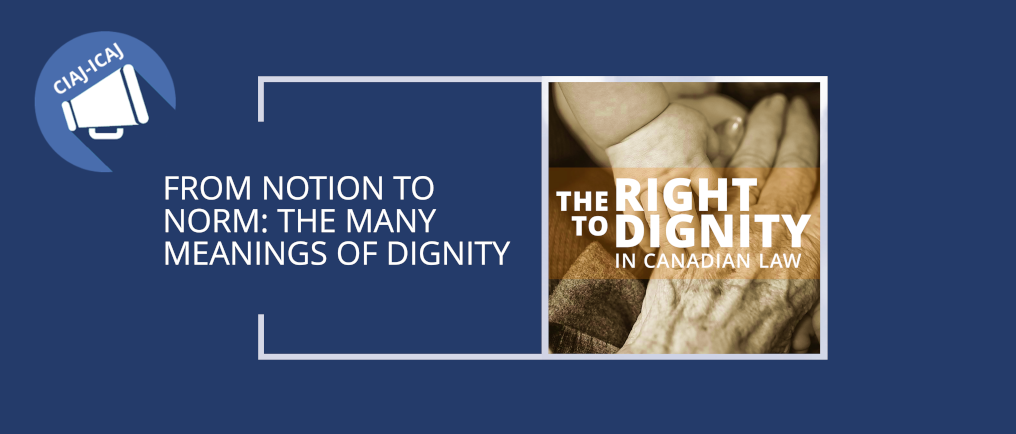From Notion to Norm: The Many Meanings of Dignity

What is meant by “dignity?” What concepts does it capture, and what does it mean to have dignity protected in law? Moreover, what quality of dignity as a legal right makes it difficult for courts to apply?
Dignity in law emerged in the early 20th century, used predominantly in constitutional documents. However, the proliferation of dignity as a legal norm followed its adoption in 1948 by the United Nations in the Universal Declaration of Human Rights. Article 1 of the Declaration holds that “human beings are born free and equal in dignity and rights” and recognizes in its preamble the “inherent dignity … of all members of the human family. The Declaration understands dignity in response to the atrocities of the 20th century, particularly the Second World War and the Holocaust. Dignity was taken as a quality inherent to human beings, inalienable and inextricable to their fundamental nature and part of the foundation of freedom, justice, and peace in the world.
Today the Supreme Court understands dignity as “among the values that underlie the [Canadian] Charter,” that finds expression in “almost every right and freedom” guaranteed therein. The case law has attached dignity to equality rights and protects the autonomy of the individual. While there is no right to dignity explicitly set out in the Charter, Quebec’s Charter of Human Rights and Freedoms provides a right to the “safeguard of dignity,” which the SCC understand as protecting against “interferences with the fundamental attributes of a human being which violate the respect to which every person is entitled simply because he or she is a human being and the respect that a person owes to himself or herself.”
Understood as such, dignity is presented as a lodestar for human rights instruments. Yet a tension exists in its application in Canadian law. Either due to its “abstract and subjective notion” or its fundamental quality and consequent wide applicability, dignity can be an additional burden for equality claimants or gets little dedicated legal articulation itself, with judges focusing on the rights claimed in conjunction with it. In the Quebec context, the SCC has interpreted the “safeguard of dignity” to protect the “humanity of every person” making the “concept of humanity” central to the safeguard of dignity. As a result, and in response to the historical context of dignity emerging in the early 20th century, the majority in that case held that in order to not trivialize the “meaningful concept” of dignity, a high and objective threshold is required to infringe it.
Thus, on the one hand, dignity as an essential quality of human beings can logically permeate many rights as it is their genesis. On the other hand, its quasi-sacred quality makes it hard to define and therefore difficult to apply in all.
This topic and many more will be discussed at CIAJ’s 46th Annual Conference on “The Right to Dignity in Canadian Law,” which will take place October 26–28, 2022 in person in Halifax, NS, and Online.
Some seasoned panellists will be offering their expertise and personal experience on Panel 1, which will focus on the many meanings of dignity:
Panel Chair
- The Honourable Lynn Smith, OC, K.C., Former Justice, Supreme Court, British Columbia
Speakers
- Jacob Weinrib, Associate Professor, Faculty of Law, Queen’s University
- Wayne Sumner, University Professor Emeritus, University of Toronto
- Cheryl Milne, Executive Director, David Asper Centre for Constitutional Rights, Faculty of Law, University of Toronto
Panel 1 keywords: multidisciplinary approach, dignity as a fundamental attribute of human beings, philosophical and sociological understandings of dignity, historical context of dignity in law, relationship between various concepts of dignity: dignity and equality, dignity and rights frameworks, dignity and health and ageing.
More blog posts on dignity are available on this page: https://ciaj-icaj.ca/en/blog/
Conference Overview
CIAJ’s 46th Annual Conference, entitled “The Right to Dignity in Canadian Law,” will discuss dignity as a fundamental human right. The conference will cover the many facets of the concept of dignity, from moral and philosophical notions to its uses as a legal norm. Discussion of the topic will be grounded in eminently pertinent issues such as the role of dignity in gender identity and reproductive rights, as well as medical assistance in dying, elder care, disability, and equality rights. The role of dignity will also be discussed in the context of the Canadian criminal justice and carceral systems, particularly with regards to Indigenous Peoples, restorative justice, the United Nations Declaration on the Rights of Indigenous Peoples, and reconciliation.
